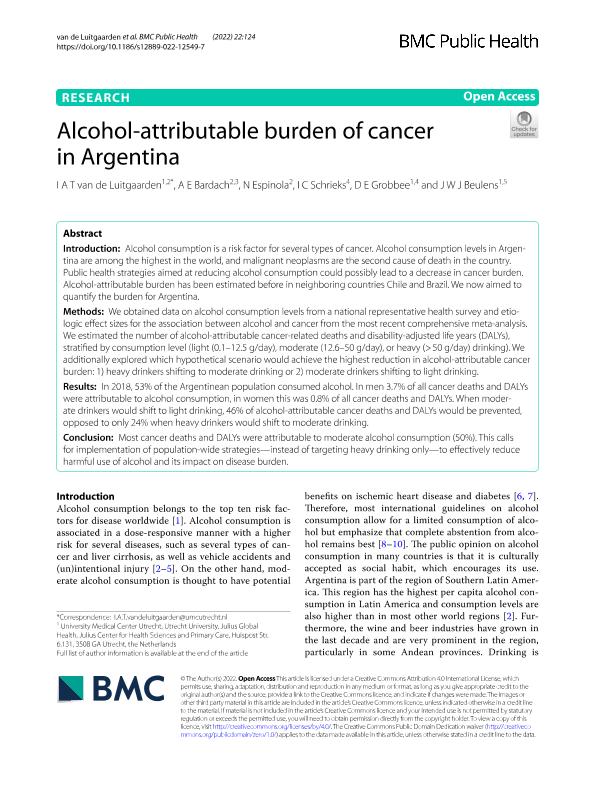Artículo
Alcohol-attributable burden of cancer in Argentina
Van de Luitgaarden, I. A. T.; Bardach, Ariel Esteban ; Espinola, N.; Schrieks, I.C.; Grobbee, D. E.; Beulens, J. W. J.
; Espinola, N.; Schrieks, I.C.; Grobbee, D. E.; Beulens, J. W. J.
 ; Espinola, N.; Schrieks, I.C.; Grobbee, D. E.; Beulens, J. W. J.
; Espinola, N.; Schrieks, I.C.; Grobbee, D. E.; Beulens, J. W. J.
Fecha de publicación:
12/2022
Editorial:
BioMed Central
Revista:
BMC Public Health
ISSN:
1471-2458
Idioma:
Inglés
Tipo de recurso:
Artículo publicado
Clasificación temática:
Resumen
Introduction: Alcohol consumption is a risk factor for several types of cancer. Alcohol consumption levels in Argentina are among the highest in the world, and malignant neoplasms are the second cause of death in the country. Public health strategies aimed at reducing alcohol consumption could possibly lead to a decrease in cancer burden. Alcohol-attributable burden has been estimated before in neighboring countries Chile and Brazil. We now aimed to quantify the burden for Argentina. Methods: We obtained data on alcohol consumption levels from a national representative health survey and etiologic effect sizes for the association between alcohol and cancer from the most recent comprehensive meta-analysis. We estimated the number of alcohol-attributable cancer-related deaths and disability-adjusted life years (DALYs), stratified by consumption level (light (0.1–12.5 g/day), moderate (12.6–50 g/day), or heavy (> 50 g/day) drinking). We additionally explored which hypothetical scenario would achieve the highest reduction in alcohol-attributable cancer burden: 1) heavy drinkers shifting to moderate drinking or 2) moderate drinkers shifting to light drinking. Results: In 2018, 53% of the Argentinean population consumed alcohol. In men 3.7% of all cancer deaths and DALYs were attributable to alcohol consumption, in women this was 0.8% of all cancer deaths and DALYs. When moderate drinkers would shift to light drinking, 46% of alcohol-attributable cancer deaths and DALYs would be prevented, opposed to only 24% when heavy drinkers would shift to moderate drinking. Conclusion: Most cancer deaths and DALYs were attributable to moderate alcohol consumption (50%). This calls for implementation of population-wide strategies—instead of targeting heavy drinking only—to effectively reduce harmful use of alcohol and its impact on disease burden.
Archivos asociados
Licencia
Identificadores
Colecciones
Articulos(CIESP)
Articulos de CENTRO DE INVESTIGACIONES EN EPIDEMIOLOGIA Y SALUD PUBLICA
Articulos de CENTRO DE INVESTIGACIONES EN EPIDEMIOLOGIA Y SALUD PUBLICA
Citación
Van de Luitgaarden, I. A. T.; Bardach, Ariel Esteban; Espinola, N.; Schrieks, I.C.; Grobbee, D. E.; et al.; Alcohol-attributable burden of cancer in Argentina; BioMed Central; BMC Public Health; 22; 1; 12-2022; 1-9
Compartir
Altmétricas



